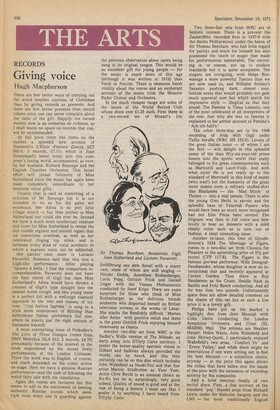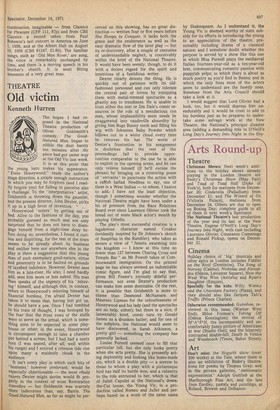RECORDS
Giving voice
Hugh Macpherson
There are few better ways of carrying out the weird heathen customs of Christmas than by giving records as presents. And there are few better presents than record tokens since one can never complain about the taste of the gift. Happily the record market now is an embarras de richesse, so I shall waste no space on records that cannot be recommended.
At full price there has come on the market a splendid new account of Donizetti's L'Elisir d'amore (Decca SET 503-5, 3 records, £7.11) which is Joan Sutherland's latest essay into this composer's taxing world, accompanied, as ever, by her husband, Richard Bonynge and the English Chamber Orchestra. This latest effort will please followers of Miss Sutherland since the music has again been made completely subordinate to her immense vocal gifts.
Usually that is said as something of a criticism of Mr Bonynge but it is not intended to be so for the gains are enormous. Her Adina is no pert little village wench — but then neither is Miss Sutherland nor could she ever be. Instead we have a much more intellectual creature and room for Miss Sutherland to reveal the rich middle register and smooth legato that we sometimes overlook, as well as her celebrated ringing top notes, and in between every kind of vocal acrobatic to which a soprano voice can be subjected.
Her partner once more is Luciano Pavarotti. Someone said that this was a Gigli-like performance. After playing ' Quanto e bella,' I find the comparison incomprehensible. Pavarotti does not have the final charm of Gigli but then Miss Sutherland's Adina would have thrown a crooner of Gigli's type straight into the nearest horse trough, and this young tenor is a perfect foil with a well-nigh classical approach to the role and masses of icy tone. ' Una furtiva lagrima ' is sung in a style more reminiscent of Bjorling than lachrymose Italian performers but elsewhere he injects just the right amount of Italianate warmth.
A most enterprising issue of Prokofiev's The Love of Three Oranges comes from HMV Melodiya (SLS 813, 2 records, £4.70) presumably because of the interest in the work engendered by the recent lively performances at the London Coliseum. There the work was in English, of course, and much depended on the comic action on-stage. Here we have a genuine Russian performance—and the task of following the weird fairy tale with the translation.
Again the voices are favoured but this seems to add to the excitement of hearing authentic Russian sounds which seem right even when one is guarding against the precious observation about opera being sung in its original tongue. This would be an excellent gift for young people — for the music is much more of this age (although it was written in 1919) than Verdi or Puccini. There is immense harsh vitality about the voices and an exuberant account of the music from the Moscow Radio Chorus and Orchestra.
In the much cheaper range are some of the issues of the World Record Club whose discs cost £1.25 each. First there is a two-record set of Mozart's Die Entfilhrung aus dem Serail with a starry cast, some of whom are still singing — Nicolai Gedda, Anneliese Rothenberger, Lucia Popp, Gottlob Frick and Gerald Unger with the Vienna Philharmonic conducted by Josef Krips. There are some surprises for those who think of Miss Rothenberger as the delicious blonde soubrette who disported herself on British television screens in the works of Lehar. She atacks the fiendishly difficult 'Marten aller Arten ' with positive relish and there is the great Gottlob Frick enjoying himself immensely as Osmin.
Another two-disc set from WRC is the Sadler's Wells version of The Mikado, an early essay into D'Oyly Carte territory. I prefer the better-quality operatic voices in Gilbert and Sullivan always provided the words can be heard, and this they certainly can be on this disc which includes John Wakefield as Nanki-Poo and that fine artist Marion Studholme as Yum Yum. Actor Clive Revill is an unusual choice as Ko-Ko but he is, surprisingly, very good indeed. Quality of sound is good and at the risk of being a heretic I must say that I prefer it to anything I have heard from D'Oyly Carte. Two three-disc sets from WRC are of historic interest. There is a pre-war Die Zauberflote, recorded first in 1937-8 with the Berlin Philharmonic under the baton of Sir Thomas Beecham. who had little regard for purists and much for himself but also possessed the touch of magic that made his performances memorable. The recording is, of course, not up to modern standards but it is quite acceptable. The singers are intriguing, with Helge Roswaenge a more powerful Tamino than we are now used to, and Wilhelm Strienz's Sarastro pushing dark, almost sour, bottom notes that would probably not gain much approval now but which match his impressive style — illogical as that may sound. The Pamina is Tiana Lemnitz, one of the most celebrated of all interpreters of the role. Just why she was so famous is explained in her serene account of Pamina's ' Ach ich fuhl's.'
The other three-disc set is the 1946 recording of Aida with Gigli under Tullio Serafin (WRC SH 153-5). Lovers of the great Italian tenor — of whom I am the first — will delight in this splendid essay of the then fifty-six-year-old primo tenore into the spinto world that really belonged to his great contemporaries such as Martinelli and Lauri-Volpi. And with what style! He is not really up to the standard of Martinelli in this kind of music (who was?) but the humanity of the great tenor makes even a military stuffed-shirt like Rhadames — the 'Mad Mitch' of Thebes — into a real person. There is also the young Gino Bechi to savour and the splendid bass of Tancredi Pasero who would have been so much more recognised had not Ezio Pinza been around. Ebe Stignani was then in full voice and how lovely to hear an Amneris with a solid chesty voice such as is now out of fashion. A most interesting issue.
Another re-issue, this time of Glyndebourne's 1934 The Marriage of Figaro, comes in a two-disc set from Classics for Pleasure at the astonishing price of 87p per record (CFP 117-8). The Figaro is the famous pre-war performer, Willi DomgrafFassbaender, whose daughter is now an international star and recently appeared at Covent Garden. Then there is Roy Henderson as the Count, Heddle Nash as Basilio and Fritz Busch conducting. And all for less than two pounds. Unfortunately space does not allow detailed comment on the charm of this set but at such a low price it is a lovely gift.
Philips have put on the market a highlight disc from their Messiah with Colin Davis conducting the London Symphony Orchestra and Choir (XL 6833050, 99p). The soloists are Heather Harper, Helen Watts, John Wakefield and John Shirley-Quirk. I particularly enjoyed Wakefield's two arias, ' Comfort Ye' and 'Every Valley,' and while there might be reservations if one were setting out to find the best Messiah — a subjective choice, anyway — at the price this again shows the riches that have fallen into the hands of the poor with the extension of recording activity by the companies.
And a brief mention finally of two recital discs. First, a fine account of the standard ' pop ' Handel arias from Richard Lewis under Sir Malcolm Sargent and the LSO — the most traditionally English
combination imaginable — from Classics for Pleasure (CFP 111, 87p) and from CBS Classics a record taken from Paul Robeson's last concert in America on June 1, 1958, and at the Albert Hall on August 10, 1958 (CBS 61247, £1.69). The familiar songs, such as ' Old Man River,' are sung, the voice is remarkably unchanged by time, and there :s a moving speech in his brother's church. It is most fitting memento of a very great man.











































 Previous page
Previous page